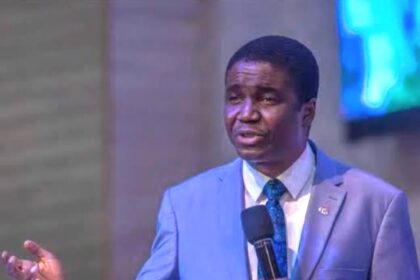The Economic and Financial Crimes Commission (EFCC) says N1,956,007,975.81 has accrued to government as interest from the public funds sized from a former Inspector-General of Police, Mr. Tafa Balogun, and other suspects under investigation or trial.
N2.25billion was confiscated from Balogun alone.
The amount was deposited in 11 accounts,according to records put together by the agency.
The seized properties from the founder of the defunct Intercontinental Bank Erastus Akingbola, former Edo State Governor Lucky Igbinedion, former Plateau State Governor Joshua Dariye and seven other highly-placed people under investigation, have yielded about N185.6million as rents for government.
The other suspects in this category are: Alhaji Tukur Muazu, Bayo Lawal, Kayode Ojuri, Timothy Akani, Esai Dangabar, Aliyu Bello and John Yusuf Yakubu.
Similalrly, the EFCC took over 75 money laundering cases involving drug barons from the National Drugs Law Enforcement Agency ( NDLEA) between 2006 and 2013.
EFCC sources said the records were put together following the controversy generated by the assets seized from the former IGP.
Balogun resigned his appointment as the IGP on January 18, 2005 following the uncovering of a huge amount in his accounts by the EFCC under its pioneer chairman, Mallam Nuhu Ribadu.
But 11years after, some critics alleged that cash and assets seized from Balogun had been re-looted.
The EFCC records says in part: “A total of 15 Spring Bank accounts were forfeited by Mr. Tafa Balogun. Of this number, four accounts had NIL (zero) balance.
“The total balance in the remaining 11 accounts as of January 2005 was N1, 226,518,163.09. In addition to this, seven treasury bills/commercial papers in the same bank had a total balance of N1, 017, 178, 719.42.
“The two added together came up to N2, 243,696,882.51. With the addition of the accrued interest of N14, 403,634.36, the figure came to N2, 258,100,516.87.
“This sum was what was paid to the commission by Spring Bank and eventually remitted to the Federal Government, through the Federal Ministry of Finance.”
But the commission said that some assets of the former IGP were yet to be disposed of because of legal disputes.
Continuing, the EFCC says: “There were legal issues on some of the properties recovered from Tafa Balogun. Other claimants emerged, with claims to the properties. The cases include the property at Plot 2220 Suez Crescent, Zone 4, Abuja, which the Commission eventually won in 2013, while the other involved a property at Plot 1488, Fugar Street, Asokoro which case the Commission lost in 2014.
” Apart from the Fugar Street Asokoro property that is now a subject of appeal by the EFCC; three other properties forfeited by Tafa Balogun are yet to be disposed of. One of the properties is located at Plot 110, Tunis Street, Wuse Zone 5, Abuja.
“Meanwhile, the total sum of N46,358,393.15 generated from the management of the property by Diya Fatimilehin & Co since 2009 was remitted to the Commission at various times.
“The remitted sum is in the Commission’s recovery account.
“The remaining two properties which appeared on the forfeiture order as Plot 75, Asokoro and Plot 2262B Maitama A6 District, Abuja, are also subject of legal disputes.”
The EFCC also admitted that it raked in about N1,956,007,975.81 from forfeited funds placed in interest yielding accounts.
It says: “The placement of forfeited monies in interest yielding accounts is not an entirely new idea. The court in various rulings ordered some funds to be placed in interest yielding accounts.
“Rather than warehousing forfeited funds in current accounts for a long period, the commission lodged such funds, including those of Tafa Balogun, in interest yielding accounts.
“The interest element is always in line with CBN Cash Reserve Ratio and not fixed. Not a single kobo is taken out by the commission under this initiative.
It is interesting to note that under this initiative, as at March 2015, the sum of N696, 590,765.36 was generated as interest on recovered funds with Access Bank Plc. “Another sum of N522,807,543.83 presently stands as interest generated from recovered funds with Ecobank Plc, while the subsidy recoveries with Enterprise Bank Plc has yielded the sum of N736,609,666.62. All these monies are intact and are held on behalf of the Federal Government until all encumbrances to their release are cleared.
“For purposes of transparency and accountability, the commission sought and obtained approval to operate a dedicated interest income account vide a letter from the Office of the Accountant General of the Federation Ref. No. AGF/TRY/RB/441/VOL.I/128 dated 3rd December, 2012.”
Meanwhile, about N185.6million was collected as rents from seized properties of Erastus Akingbola, Lucky Igbinedion, Alh. Tukur Muazu, Bayo Lawal, Kayode Ojuri, Timothy Akani, Esai Dangabar, Aliyu Bello, Joshua Chibi Dariye and John Yusuf Yakubu.
“For the avoidance of doubt, the said rents were remitted to the commission as follows:
The sum of N70, 655,872.47 was collectively generated from the management of the forfeited properties of Erastus Akingbola, Lucky Igbinedion and Alh. Tukur Muazu.
The sum of N99, 083,241.75 was collectively generated from the management of the forfeited properties of Erastus Akingbola, Bayo Lawal, Kayode Ojuri, Timothy Akani, Esai Dangabar, Aliyu Bello, Joshua Chibi Dariye and others.
iii. The N15, 944,222.40 was collectively generated from the management of the forfeited properties of Mr. Bayo Lawal, Esai Dangabar and John Yusuf Yakubu.
On money laundering cases by drug barons, the EFCC confirmed receipt of 75 cases from the National Drug Law Enforcement Agency ( NDLEA) between 2006 and 2007.
It said: “Between 2006 and 2013, the EFCC received a total of 75 cases from NDLEA. The cases related to various offences including, unlawful possession of financial instruments, currency trafficking, unlawful possession of counterfeit financial instrument, obtaining under false pretense and unlawful possession of fake currencies among others.
“The cases were basically transferred along with exhibits which include financial instruments in form of cheques, drafts, traveler’s cheques, money order and cash in local and foreign currencies which were mostly fake or counterfeit in nature.”
– The Nation


